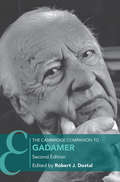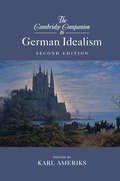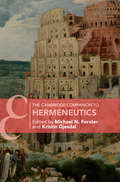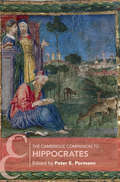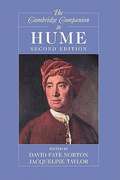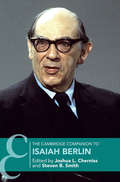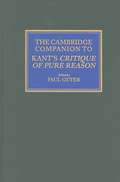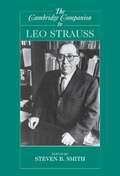- Table View
- List View
The Cambridge Companion to Gadamer
by Robert J. DostalHans-Georg Gadamer (b. 1900) is widely recognized as the leading exponent of philosophical hermeneutics. The essays in this collection examine Gadamer's biography, the core of hermeneutical theory, and the significance of his work for ethics, aesthetics, the social sciences, and theology. There is full consideration of Gadamer's appropriation of Hegel, Heidegger and the Greeks, as well as his relation to modernity, critical theory and poststructuralism.
The Cambridge Companion to Gadamer (Cambridge Companions to Philosophy)
by Robert DostalHans-Georg Gadamer (1900–2002) is widely recognized as the leading exponent of philosophical hermeneutics. The essays in this volume examine Gadamer's biography, the core of hermeneutical theory, and the significance of his work for ethics, aesthetics, the social sciences, and theology. There is full consideration of Gadamer's appropriation of Hegel, Heidegger and the Greeks, as well as his relation to modernity, critical theory and poststructuralism. This revised edition includes several new chapters on aspects of Gadamer's work, as well as updated chapters from the first edition and the most comprehensive bibliography of works by and about Gadamer available in the English language.
The Cambridge Companion to Galileo
by Peter MachamerNot only a hero of the scientific revolution, but after his conflict with the church, a hero of science, Galileo is today rivalled in the popular imagination only by Newton and Einstein. But what did Galileo actually do, and what are the sources of the popular image we have of him? This collection of specially-commissioned essays is unparalleled in the depth of its coverage of all facets of Galileo's work. A particular feature of the volume is the treatment of Galileo's relationship with the church. It will be of interest to philosophers, historians of science, cultural historians and those in religious studies.
The Cambridge Companion to German Idealism
by Karl AmeriksThe Cambridge Companion to German Idealism, first published in 2000, offers a comprehensive, penetrating and informative guide to what is regarded as the classical period of German philosophy. Kant, Fichte, Hegel and Schelling are all discussed in detail, together with a number of their contemporaries, such as Hölderlin and Schleiermacher, whose influence was considerable but whose work is less well known in the English-speaking world. The essays in the volume trace and explore the unifying themes of German Idealism, and discuss their relationship to Romanticism, the Enlightenment, and the culture of seventeenth- and eighteenth-century Europe. The result is an illuminating overview of a rich and complex philosophical movement, and will appeal to a wide range of readers in philosophy, German studies, theology, literature, and the history of ideas.
The Cambridge Companion to German Idealism (Cambridge Companions to Philosophy)
by Karl AmeriksThis updated edition offers a comprehensive, penetrating, and informative guide to what is regarded as the classical period of German philosophy. Kant, Fichte, Hegel, and Schelling are all discussed in detail, along with contemporaries such as Hölderlin, Novalis, and Schopenhauer, whose influence was considerable but whose work is less well known in the English-speaking world. Leading scholars trace and explore the unifying themes of German Idealism and discuss its relationship to Romanticism, the Enlightenment, and the culture of eighteenth- and nineteenth-century Europe. This second edition offers an updated bibliography and includes three entirely new chapters, which address aesthetic reflection and human nature, the chemical revolution after Kant, and organism and system in German Idealism. The result is an illuminating overview of a rich and complex philosophical movement, and will appeal to a wide range of interested readers in philosophy, literature, theology, German studies, and the history of ideas. Includes three new chapters from experts in the field, with the other chapters and the bibliography updated. The book will appeal to students and scholars of all levels, providing incisive and detailed discussion as well as presenting a comprehensive look at this major period as a whole. Explores the roles of key figures including Kant, Hegel, and Fichte alongside the contributions of lesser-known philosophers.
The Cambridge Companion to Greek and Roman Philosophy
by David SedleyThis wide-ranging introduction to the study of philosophy in the ancient world surveys the period's developments and evaluates a comprehensive series of major thinkers, ranging from Pythagoras to Epicurus. Tables, illustrations, and extensive advice on further reading contribute to an ideal book for survey courses on the history of ancient philosophy. It will be an invaluable guide for those interested in the philosophical thought of a rich and formative period.
The Cambridge Companion to Hannah Arendt
by Dana VillaHannah Arendt was one of the foremost political thinkers of the twentieth century, and her particular interests have made her one of the most frequently cited thinkers of our time. This Companion examines the primary themes of her multi-faceted work, from her theory of totalitarianism and her controversial idea of the 'banality of evil' to her classic studies of political action and her final reflections on judgment and the life of the mind. Each essay examines the political, philosophical, and historical concerns which shaped Arendt's thought, and which prompted her to become one of the most unapologetic champions of the political life in the history of Western thought.
The Cambridge Companion to Hegel
by Frederick C. BeiserFew thinkers are more controversial in the history of philosophy than Hegel. He has been dismissed as a charlatan and obscurantist, but also praised as one of the greatest thinkers in modern philosophy. No one interested in philosophy can afford to ignore him. This volume considers all the major aspects of Hegel's work: epistemology, logic, ethics, political philosophy, aesthetics, philosophy of history, philosophy of religion. Special attention is devoted to problems in the interpretation of Hegel: the unity of the Phenomenology of Spirit; the value of the dialectical method; the status of his logic; the nature of his politics. A final group of chapters treats Hegel's complex historical legacy: the development of Hegelianism and its growth into a left and right wing school; the relation of Hegel and Marx; and the subtle connections between Hegel and contemporary analytic philosophy.
The Cambridge Companion to Hegel and Nineteenth-Century Philosophy
by Frederick C. BeiserThe Cambridge Companion to Hegel and Nineteenth-Century Philosophy examines Hegel within his broader historical and philosophical contexts. Covering all major aspects of Hegel's philosophy, the volume provides an introduction to his logic, epistemology, philosophy of mind, social and political philosophy, philosophy of nature and aesthetics. It includes essays by an internationally recognised team of Hegel scholars. The volume begins with Terry Pinkard's article on Hegel's life, a conspectus of his biography on Hegel. It also explores some topics much neglected in Hegel scholarship: such as Hegel's hermeneutics and relationship to mysticism. Aimed at students and scholars of Hegel, this volume will be essential reading for anyone interested in nineteenth-century philosophy. The bibliography includes the most important English-language literature on Hegel written in the last fifteen years.
The Cambridge Companion to Heidegger
by Charles B. GuignonMartin Heidegger is now widely recognised alongside Wittgenstein as one of the greatest philosophers of the twentieth century. He redefined the central task of philosophy as the investigation of the nature of being, and has exerted a profound impact on literary theory, theology, psychotherapy, political theory, aesthetics, environmental studies, as well as mainstream philosophy. His thought has contributed to the recent turn to hermeneutics in philosophy and the social sciences, and to current post-modern and post-structuralist developments. The disclosing of his deep involvement in the ideology of Nazism has provoked much debate about the relation of philosophy to politics. This volume contains both overviews of Heidegger's life and works and analysis of his most important work, Being and Time. In addition there are discussions of Heidegger's thought in relation to mysticism, traditional theology, ecology, psychotherapy and the philosophy of language. The volume also contains the first in-depth study of what has been called Heidegger's second greatest work, the Beitrage zur Philosophie.
The Cambridge Companion to Heidegger's Being and Time
by Mark A. WrathallThe Cambridge Companion to Heidegger's "Being and Time" contains seventeen chapters by leading scholars of Heidegger. It is a useful reference work for beginning students, but also explores the central themes of Being and Time with a depth that will be of interest to scholars. The Companion begins with a section-by-section overview of Being and Time and a chapter reviewing the genesis of this seminal work. The final chapter situates Being and Time in the context of Heidegger's later work. The remaining chapters examine the core issues of Being and Time, including the question of being, the phenomenology of space, the nature of human being (our relation to others, the importance of moods, the nature of human understanding, language), Heidegger's views on idealism and realism and his position on skepticism and truth, Heidegger's account of authenticity (with a focus on his views on freedom, being toward death, and resoluteness), and the nature of temporality and human historicality.
The Cambridge Companion to Hermeneutics (Cambridge Companions to Philosophy)
by Michael N. Forster Kristin GjesdalHermeneutics, the study of interpretation, is an essential and valuable branch of philosophy. Hermeneutics is also a central component of the methodology of the social sciences and the humanities, for example historiography, anthropology, art history, and literary criticism. In a sequence of accessible chapters, contributors across the human sciences explain the leading concepts and ideas of hermeneutics, the historical development of the field, the importance of hermeneutics in philosophy today, and the ways in which it can address contemporary concerns including intercultural relations, relations between subcultures within a single society, and relations across race and gender. Clearly structured and written in non-technical language, this Companion will be an important contribution to a growing field of study.
The Cambridge Companion to Hippocrates (Cambridge Companions to Philosophy)
by Peter E. PormannHippocrates is a towering figure in Greek medicine. Dubbed the 'father of medicine', he has inspired generations of physicians over millennia in both the East and West. Despite this, little is known about him, and scholars have long debated his relationship to the works attributed to him in the so-called 'Hippocratic Corpus', although it is undisputed that many of the works within it represent milestones in the development of Western medicine. In this Companion, an international team of authors introduces major themes in Hippocratic studies, ranging from textual criticism and the 'Hippocratic question' to problems such as aetiology, physiology and nosology. Emphasis is given to the afterlife of Hippocrates from Late Antiquity to the modern period. Hippocrates had as much relevance in the fifth-century BC Greek world as in the medieval Islamic world, and he remains with us today in both medical and non-medical contexts.
The Cambridge Companion to Hobbes
by Tom SorellWritten by scholars from five countries, this study discusses Hobbes' view of the nature of history and the works of history written by him.
The Cambridge Companion to Hobbes's Leviathan
by Patricia SpringborgThis Companion makes a new departure in Hobbes scholarship, addressing a philosopher whose impact was as great on Continental European theories of state and legal systems as it was at home. This volume is a systematic attempt to incorporate work from both the Anglophone and Continental traditions, bringing together newly commissioned work by scholars from ten different countries in a topic-by-topic sequence of essays that follows the structure of Leviathan, re-examining the relationship among Hobbes's physics, metaphysics, politics, psychology, and religion. Collectively they showcase important revisionist scholarship that re-examines both the context for Leviathan and its reception, demonstrating the degree to which Hobbes was indebted to the long tradition of European humanist thought. This Cambridge Companion shows that Hobbes's legacy was never lost and that he belongs to a tradition of reflection on political theory and governance that is still alive, both in Europe and in the diaspora.
The Cambridge Companion to Hume
by David Fate Norton Jacqueline TaylorEach Cambridge Companion to a philosophical figure is made up of specially commissioned essays by an international team of scholars, providing students and non-specialists with an introduction to a major philosopher. The series aims to dispel the intimidation that readers may feel when faced with the work of a challenging thinker. David Hume is now considered one of the most important philosophers of the Western world. Although best known for his contributions to the theory of knowledge, metaphysics, and philosophy of religion, Hume also influenced developments in the philosophy of mind, psychology, ethics, political and economic theory, political and social history, and aesthetic theory. The fifteen essays in this volume address all aspects of Hume's thought. The picture of him that emerges is that of a thinker who, though often critical to the point of skepticism, was nonetheless able to build on that skepticism a constructive, viable, and profoundly important view of the world. Also included in this volume are Hume's two brief autobiographies and a bibliography suited to those beginning their study of Hume. This second edition of one our most popular Companions includes six new essays and a new introduction, and the remaining essays have all been updated or revised.
The Cambridge Companion to Hume's Treatise
by Donald C. Ainslie Annemarie ButlerRevered for his contributions to empiricism, skepticism, and ethics, David Hume remains one of the most important figures in the history of Western philosophy. His first and broadest work, A Treatise of Human Nature (1739-40), comprises three volumes, concerning the understanding, the passions, and morals. He develops a naturalist and empiricist program, illustrating that the mind operates through the association of impressions and ideas. This companion features essays by leading scholars that evaluate the philosophical content of the arguments in Hume's Treatise while considering their historical context. The authors examine Hume's distinctive views on causation, motivation, free will, moral evaluation, and the origins of justice, which continue to influence present-day philosophical debate. This collection will prove a valuable resource for students and scholars exploring Hume, British empiricism, and modern philosophy.
The Cambridge Companion to Isaiah Berlin (Cambridge Companions to Philosophy)
by Steven Smith Joshua ChernissIsaiah Berlin (1909–1997) was a central figure in twentieth-century political thought. This volume highlights Berlin's significance for contemporary readers, covering not only his writings on liberty and liberalism, the Enlightenment and Romanticism, Russian thinkers and pluralism, but also the implications of his thought for political theory, history, and the social sciences, as well as the ethical challenges confronting political actors, and the nature and importance of practical judgment for politics and scholarship. His name and work are inseparable from the revival of political philosophy and the analysis of political extremism and defense of democratic liberalism following World War II. Berlin was primarily an essayist who spoke through commentary on other authors and, while his own commitments and allegiances are clear enough, much in his thought remains controversial. Berlin's work constitutes an unsystematic and incomplete, but nevertheless sweeping and profound, defense of political, ethical, and intellectual humanism in an anti-humanistic age.
The Cambridge Companion to Kant
by Paul GuyerThe fundamental task of philosophy since the seventeenth century has been to determine whether the essential principles of both knowledge and action can be discovered by human beings unaided by an external agency. No one philosopher contributed more to this enterprise than Kant, whose Critique of Pure Reason (1781) shook the very foundations of the intellectual world. Kant argued that the basic principles of the natural sciences are imposed on reality by human sensibility and understanding, and thus that human beings are also free to impose their own free and rational agency on the world. This volume is the only systematic and comprehensive account of the full range of Kant's writings available, and the first major overview of his work to be published in more than a dozen years. An internationally recognized team of Kant scholars explore Kant's conceptual revolution in epistemology, metaphysics, philosophy of science, moral and political philosophy, aesthetics, and the philosophy of religion. The volume also traces the historical origins and consequences of Kant's work.
The Cambridge Companion to Kant and Modern Philosophy
by Paul GuyerThe philosophy of Immanuel Kant is the watershed of modern thought, which irrevocably changed the landscape of the field and prepared the way for all the significant philosophical movements of the nineteenth and twentieth centuries. This 2006 volume, which complements The Cambridge Companion to Kant, covers every aspect of Kant's philosophy, with a particular focus on his moral and political philosophy. It also provides detailed coverage of Kant's historical context and of the enormous impact and influence that his work has had on the subsequent history of philosophy. The bibliography also offers extensive and organized coverage of both classical and recent books on Kant. This volume thus provides the broadest and deepest introduction currently available on Kant and his place in modern philosophy, making accessible the philosophical enterprise of Kant to those coming to his work for the first time.
The Cambridge Companion to Kant's Critique of Pure Reason
by Paul GuyerImmanuel Kant's Critique of Pure Reason, first published in 1781, is one of the landmarks of Western philosophy, a radical departure from everything that went before and an inescapable influence on all philosophy since its publication. This Companion is the first collective commentary on this work in English. The seventeen chapters have been written by an international team of scholars, including some of the best-known figures in the field as well as emerging younger talents. The first two chapters situate Kant's project against the background of continental rationalism and British empiricism, the dominant schools of early modern philosophy. Eleven chapters then expound and assess all the main arguments of the Critique. Finally, four chapters recount the enormous influence of the Critique on subsequent philosophical movements, including German Idealism and Neo-Kantianism, twentieth-century continental philosophy, and twentieth-century Anglo-American analytic philosophy. The book concludes with an extensive bibliography.
The Cambridge Companion to Karl Rahner
by Declan Marmion Mary E. HinesKarl Rahner (1904-1984) was one of the most significant theological voices of the twentieth century. For many his theology symbolizes the Catholic Church's entry into modernity. Part of his enduring appeal lies in his ability to reflect on a variety of issues in theology and spirituality and direct this plurality into a few basic convictions. In addition to the main themes of Rahner's work, this Companion assesses his significance for contemporary theology through dialogues with many current concerns including: religious pluralism, spirituality, postmodernism, ecumenism, ethics and developments in political and feminist theologies.
The Cambridge Companion to Kierkegaard
by Alastair HannayEach volume of this series of Companions to major philosophers contains specially-commissioned essays by an international team of scholars, together with a substantial bibliography, and will serve as a reference work for students and non-specialists. The contributors to this Companion probe the full depth of Kierkegaard's thought revealing its distinctive subtlety. The topics covered include Kierkegaard's views on art and religion, ethics and psychology, theology and politics, and knowledge and virtue. Much attention is devoted to the pervasive influence of Kierkegaard in twentieth-century philosophy. New readers will find this the most convenient and accessible guide to Kierkegaard currently available. Advanced students and specialists will find a conspectus of recent developments in the interpretation of Kierkegaard.
The Cambridge Companion to LEO STRAUSS
by Steven B. SmithLeo Strauss was a central figure in the 20th century renaissance of political philosophy. The essays of The Cambridge Companion to Leo Strauss provide a comprehensive and non-partisan survey of the major themes and problems that constituted Strauss's work. These include his revival of the great 'quarrel between the ancients and the moderns,' his examination of tension between Jerusalem and Athens, and most controversially his recovery of the tradition of esoteric writing. The volume also examines Strauss's complex relation to a range of contemporary political movements and thinkers, including Edmund Husserl, Martin Heidegger, Max Weber, Carl Schmitt, and Gershom Scholem, as well as the creation of a distinctive school of 'Straussian' political philosophy.
The Cambridge Companion to Leibniz
by Nicholas JolleyA remarkable thinker, Gottfried Leibniz made fundamental contributions not only to philosophy, but also to the development of modern mathematics and science. At the center of Leibniz's philosophy stands his metaphysics, an ambitious attempt to discover the nature of reality through the use of unaided reason. This volume provides a systematic and comprehensive account of the full range of Leibniz's thought, exploring the metaphysics in detail and showing its subtle and complex relationship to his views on logic, language, physics, and theology.

